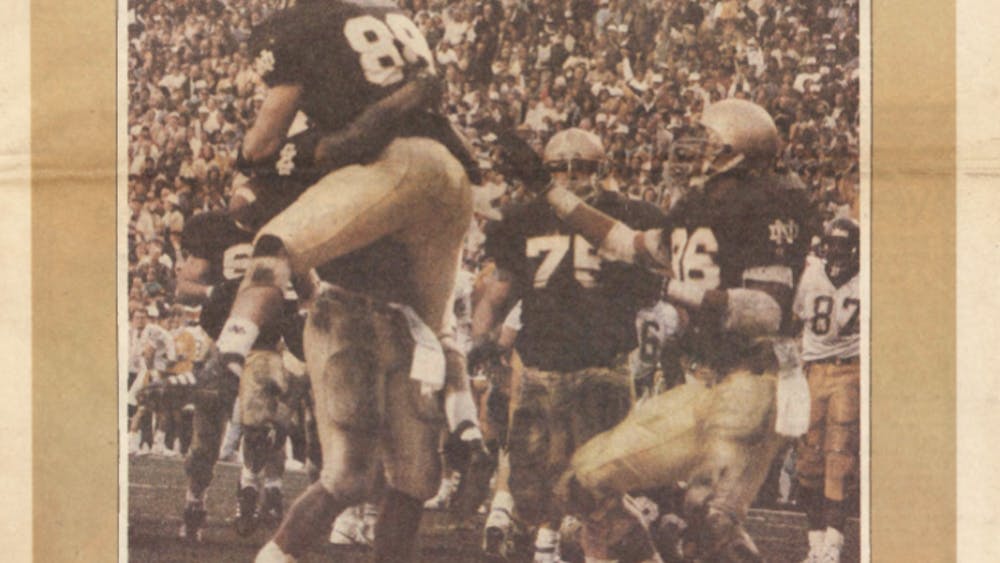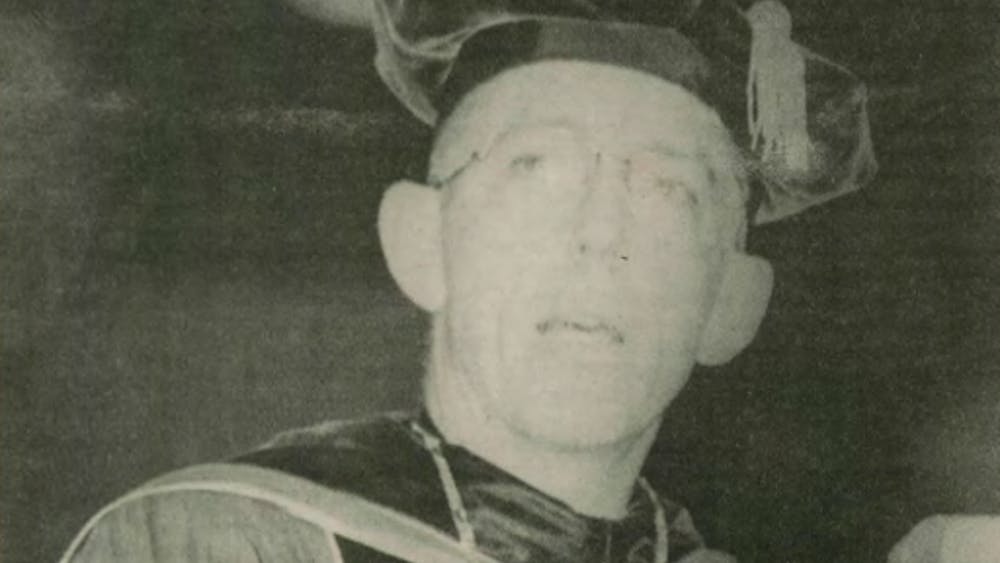In this episode of The Recap, host Genevieve Coleman covers how the tri-campus community supported survivors of sexual assault and interpersonal violence in this year’s annual Take Back the Night and the Notre Dame students who received recognition for their research from NASA.
[audio mp3="https://ndsmcobserver.com/wp-content/uploads/2021/04/1618781418-d49c9318a09da4e.mp3"][/audio]
The Recap is available to stream on Anchor, Breaker, Google Podcasts, RadioPublic and Spotify.
Genevieve Coleman: From the News Department of The Observer, this is The Recap. I’m Genevieve Coleman, and I’ll be hosting this episode of The Observer’s News podcast — serving Notre Dame, Saint Mary’s and Holy Cross.
Genevieve Coleman: Let’s begin with some updates surrounding COVID on the tri-campus.
Notre Dame has seen a decrease in COVID-19 cases over the past week. Between April 10 and April 16, the 7-day moving average has dropped from 9.7 to 5.7. During the same period, the University reported 40 positive cases, with an overall total of 1,470 cases. Sixty-nine of these cases are estimated to still be active.
University President Fr. John Jenkins recently announced that over 90% of undergraduate and professional students had received at least one dose of the COVID-19 vaccine, allowing Notre Dame to relax some on-campus restrictions. According to Jenkins’ message, beginning on April 21, students may begin to visit each other in the 24-hour spaces in residence halls and gather in groups of less than 25 outdoors.
In addition, Saint Mary’s and Holy Cross announced this week that students will be required to receive the COVID-19 vaccination for the 2021-2022 academic year. This follows last week’s announcement about the new vaccination requirement by Notre Dame.
Now onto some of the major headlines of the week. On Wednesday night, the tri-campus gathered together for this year’s annual Take Back the Night, an event designed to provide support for survivors of interpersonal violence and sexual assault. Here’s news writer Isabella Laufenberg with the story.
Isabella Laufenberg: Notre Dame’s Gender Relations Center (GRC) and Saint Mary’s Belles Against Violence Office (BAVO) were two organizations that helped plan this year’s Take Back the Night. GRC program coordinator for healthy relationships and community outreach Kaitlyn Stankiewicz discussed the importance of one of the night’s programs “Speak Out,” which allowed survivors to tell their stories in a safe and welcoming environment.
Kaitlyn Stankiewicz: And so through hearing their stories, we’re able to, you know, kind of hear the reality of what’s going on with students in our tri-campus community and stand in solidarity with them and saying like, ‘We’re sorry this has happened to you and we are really working hard to make sure that we can change the culture to where this doesn’t happen on our campus and in our community.”
Genevieve Coleman: The night also included a march around Notre Dame’s campus, as well as a prayer vigil. Here’s associate news editor Maggie Eastland with more on coverage from the prayer service.
Maggie Eastland: The tri-campus assembled on South Quad to pray for healing for survivors of sexual assault and an end to violence of all kinds. The service consisted of a performance from Bellacappella, Scripture readings and reflections from Brother Bill Zaydak.
Bill Zaydak: We ask for healing for all people who have been harmed by violence and for all who love them. Inspire us gathered together here tonight to continue to stand against violence and to walk with those harmed.
Maggie Eastland: At the end of the vigil, those gathered were given candles as a symbol of hope.
Isabella Laufenberg: Thinking to the future, Stankiewicz commented on the need to change rape culture by not making jokes about sexual assault because it minimizes a survivor’s experience.
Kaitlyn Stankiewicz: Comments about that — jokes about rape [and] sexual assault — kind of minimizes the severity of someone who’s gone through that experience to joke about it, because it’s really traumatizing. People’s lives are changed forever when they have that experience.
Genevieve Coleman: BAVO coordinator Liz Coulston hoped that after the event, students would develop a better understanding about how much sexual assault and interpersonal violence affect the tri-campus community — and how students themselves can enact change.
Liz Coulston: I really hope that students walk away with an understanding of how prevalent these issues are in our tri-campus community and the power that they hold to address these issues, not only with, you know, our type of bystander intervention with stepping in when you see something, and taking action, but also kind of some of that proactive stuff like showing support for survivors.
Genevieve Coleman: Moving onto our next story, Gabrielle Penna interviewed a group of Notre Dame students, who were selected as finalists for a contest hosted by NASA.
Senior Katy Ryan and her group entered the Student Payload Opportunity with Citizen Science contest in August with a proposal to examine differences in growth and mutations in two types of bacteria when exposed to microgravity.
Ryan, wanting to learn more about the space science, was excited to do research for the contest. She said, “That’s a pretty hard field to break into, so I leapt at the chance.”
One of her teammates, senior Andrea Lebron, spoke on how the group prepared for the contest.
Andrea Lebron: So in the end, we reached out to Dr. Shrout and he said that he would help us as our mentor for the project. And then we just started reading and reading and reading and that was the initial part of the project so like reading a lot of data like a lot of papers on astrobiology and antibiotic resistance. And then I had worked with Pseudomonas aeruginosa, which is a bacteria that we wanted to test in space — I had been using it for my own projects. So, basically the idea came from what I was doing in lab with Dr. Shrout and then we included the astrobiology aspect to it.
Genevieve Coleman: According to Lebron, even though the team did not win the competition, she felt very empowered by her experience on the project.
Andrea Lebron: It was just so much fun [to] just follow things that you just don’t think you would have done and things that you wanted to do when you were younger. College is just the time to explore and just do crazy things, especially in the academic aspect, because I don't think I'll ever have a chance to do something like that ever again — just to use my science in something that I’m just very passionate about.
Genevieve Coleman: That’s all for this episode of The Recap. Thank you for listening. Tune in next week for a new summary of the major headlines on Notre Dame, Saint Mary’s and Holy Cross’ campuses. This has been Genevieve Coleman for The Observer.
Music by Ryan Neff
Read More
Trending









